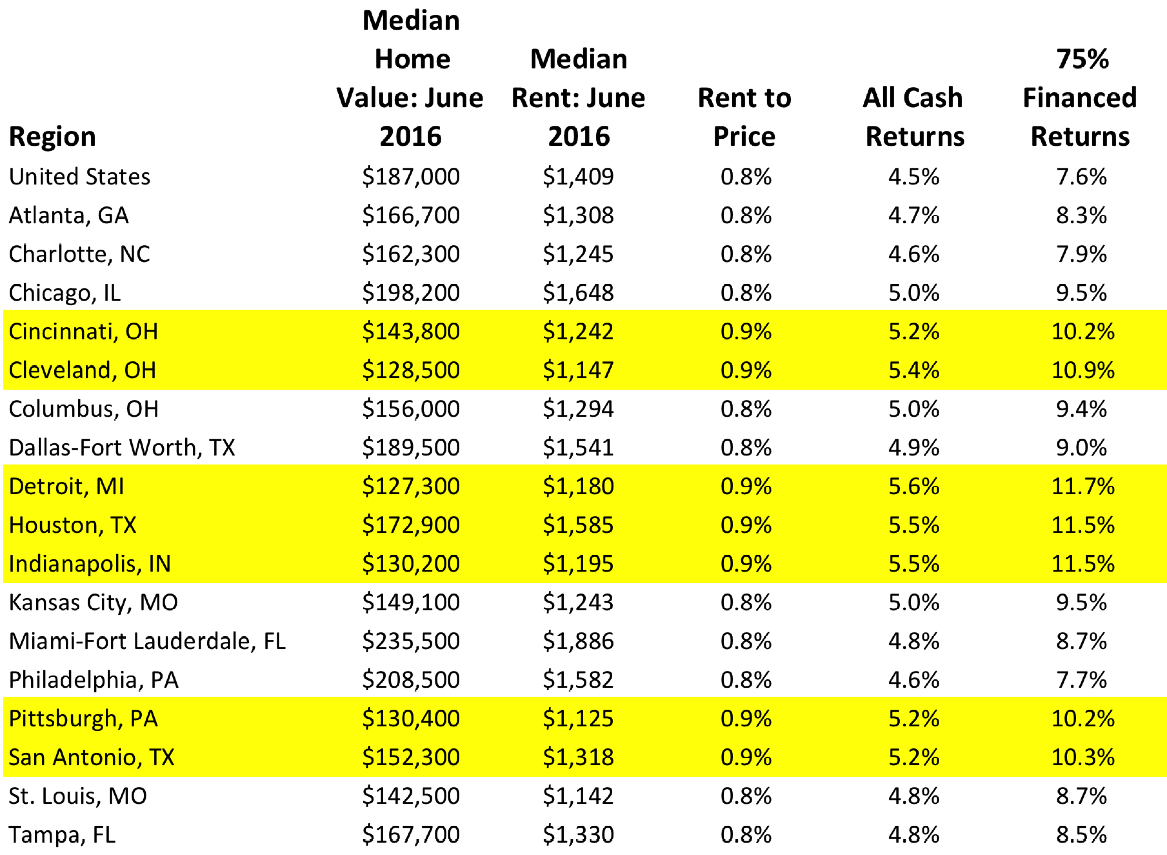

Finding the Perfect Rental Market
As I begin my journey to build my out-of-state real estate portfolio, the first thing I need to do is identify potential markets to evaluate more closely. I'll dedicate a post in the future to detail my full investing philosophy and rationale, but for now i've listed a few of the key factors that I'll be looking for to identify the "perfect" market.
- Stable Rental Market: My strategy doesn't rely on significant price appreciation, but I do need confidence that I am investing in markets and properties where I can reliably forecast the rent and vacancy levels. I tend to think rent affordability (median income/rent) is one of the key factors to determine the relative stability of the rental market in addition to population growth and job growth.
- Experienced Local Partners: I will need one or more partners who can reliably source and screen properties that will meet my criteria, potentially manage any rehab and repairs, screen and place a quality tenant, and handle ongoing management.
- Above Average Rental Returns: This is where I will start to narrow my search today. For this venture to be worthwhile I need to be able to achieve returns that are well in excess of what is achievable in the stock market. It's interesting that the average rental return in the US is ~8%, which is about what I would expect to earn from a diversified stock portfolio over time.
I started with 35 of the largest metro areas and leveraged data available on Zillow to approximate the average home sale price and monthly rent. From my experience Zillow numbers can sometime be misleading (particularly for market rent levels), but directionally this should be helpful to identify the rental markets with the highest return potential.
Not surprisingly New York City and many of the California markets don't fare very well with this type of evaluation. The sale prices are way too high without a corresponding increase in the typical rental rates. These markets often make up for lower rental returns with the potential for above-average price appreciation, but that is not a core focus of my initial strategy. There also could be particular cities and neighborhoods in some of these higher cost metro areas that offer more attractive buy-and-hold rental metrics, but for efficiency I will use the below high-level analysis as an initial filter. I have highlighted the seven markets with indicative returns above 10% and will start my search by evaluating these markets first.
In my next post I will begin to evaluate some of the larger cities in each of these markets in order to further narrow my focus and hopefully identify several markets with the potential for 15%+ annual returns.
Looking for 15%+ Returns? See A List of Top Markets Over $75k
Markets with Above Average Rental Returns (Based on 35 Largest Areas)

Analysis Assumptions
- Includes large metro areas with rental returns above the US average
- Median home values and rent taken from Zillow as of June 2016
- Rent to Price based on Monthly Median Rent divided by Median Home Value
- All Returns are based on the 50% rule (assumes Taxes, Insurance, Property Management, Vacancy, Maintenance, and Other Expenses are covered by 50% of the annual gross rent)
- 75% Financed Returns assume that 75% of the purchase price is financed at 5% with a 30% effective tax rate (3.5% after-tax)
Have you invested in any of the above markets? I'd love to hear what you think and if there are any particular cities that you think I should focus on in my next post.

Comments (4)
Nice post! I am looking to find my first investment property in Houston and am working on analyzing neighborhoods in the Houston metro. Your post gives me some ideas of how to go about it!
Tom MacDonald, almost 9 years ago
Tom - Glad you found this helpful. Houston certainly seems to have interesting opportunities. I'll probably have a dedicated post on Houston in the future.
Isaac Taylor, almost 9 years ago
Realistically, this misses population growth patterns and trends. Otherwise, great article!
Lance Robinson, almost 9 years ago
Thanks @Lance Robinson. Agree that population trends certainly matter and are particularly important for potential appreciation. I have found that rental prices tend to be fairly stable in markets like Detroit that have faced pretty significant population declines (although vacancy rates probably go up). I compare that to NYC where population trends are stronger, but rental prices seem a bit more volatile at least when you factor in various concessions. Probably has a lot to do with rental affordability and how closely tied rents are to local economic factors. It'll be interesting to run some analysis on that although the historical rental price data seems a bit unreliable.
Isaac Taylor, almost 9 years ago